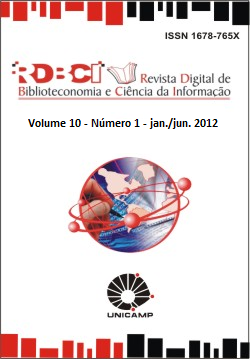Abstract
Abstract Taking into account information as element of noteworthy importance for the functioning of the organizations, with emphasis on management activities, this research was conducted with the aim to investigate how the female managers of the IFPB deanship use information. For this reason, we carried out a bibliographical investigation as well as a field research whose data were analyzed according to the quantitative and qualitative approaches. The results pointed out a balance in relation to the amount of women in management tasks. In a total of 56 management duties, 43% have women in charge of. We also noticed that the female managers present a good level of education considering that only 11% have the undergraduation course; the other ones hold post-graduation diplomas, such as: specialization, master and doctorate. As concerns the use of information accomplished by such managers, the results are frustrating because, nowadays, they still cannot have their information needs fulfilled.
References
BORGES, M.E.N. A informação como recurso gerencial das organizações na sociedade do conhecimento. Ciência da Informação, Brasília, DF, v.24, n. 2, ago. 1995.Disponível em: <http://revista.ibict.br/index.php/ciinf/article/view/551/500>. Acesso em: 11 Out. 2010.
BRAGA,A. A gestão da informação. [1996].Disponível em :<http://www.ipv.pt/millenium/19_arq1.htm>. Acesso em: 29 out. 2007.
BRUSCHINI, C. Gênero e trabalho no Brasil: novas conquistas ou persistência da discriminação? (Brasil, 1985-1995). In: ROCHA, M. I. B. da (Org.).Trabalho e gênero: mudanças, permanências e desafios. São Paulo: Editora 34, 2000. p. 13-58.
CARREIRA,D.; AJALMIL, M.; MOREIRA, T.A Liderança feminina no século 21. São Paulo: Cortez, 2001.
CHOO, C.W. A organização do conhecimento: como as organizações usam a informação para criar significados, construir conhecimento e tomar decisões. 2. ed. São Paulo: SENAC São Paulo, 2006. 425 p.
DRUCKER, P. F. Sociedade pós-capitalista. Lisboa: Difusão Cultural, 1993.
FERREIRA, S. M. S. P. Estudo de necessidade de informação: dos paradigmas tradicionais à abordagem sense-making. Abedb,n. 2, 1997. Disponível em: <http://www.eca.usp.br/nucleos/sense/textos/sumar.htm>.Acesso em: 04 jun. 2007.
FLIPPO, E. B.; MUSINGER, G. M. Management.8. ed. Boston: Allyn & Bacon, 1990.
KURZAWA, L.L. P. O Papel da mulher na gestão pública. Artigo. 2003. Disponível em:<http://www.sefaz.ms.gov.br/age/artigostec/artigoluciane.pdf>. Acesso em: 10 out. 2010.
MARX, K. Manifesto do Partido Comunista.São Paulo, Cortez, 1998.
MATTELART, A. História da sociedade da informação. São Paulo: Loyola, 2002.
MIRANDA, R. C. R. O uso da informação na formulação de ações estratégicas pelas empresas. Ciência da Informação, Brasília, DF, v. 28, n. 3, p.284-290, set./dez. 1999.
MORESI, E. A. D. O contexto organizacional. In: TARAPANOFF, Kira. (Org.). Inteligência organizacional e competitiva. Brasília, DF: Universidade de Brasília, 2001.
MORITZ, G. O.; PEREIRA, M.Processo decisório. Florianópoli : SEAD/UFSC, 2006. 168f. TCC (Curso de Graduação em Administração a Distância) –UFSC, 2006.
PETERS, T. J. The best new managers will listen, motivate, support: isn't that just like a woman? Working Woman, p. 216-217, Sep.1990.
RICHARDSON, R. J. et al. Pesquisa social: método e técnica. 3. ed. São Paulo: Atlas, 1999. 334p.
SANTOS,A. A. O perfil gerencial da mulher brasileira [online], [2003]. Disponível em:< http://www.caliper.com.br/novo_site/artigo_desc.php?cod=36>. Acesso em: 02 set. 2010.
SOUZA,T. M. S. A emoção como tecnologia de poder e de gênero. Projeto História, São Paulo, n.34, p. 49-67, jun. 2007. Disponível em: <http://revistas.pucsp.br/index.php/revph/article/view/2466/1561>. Acesso em: 02 set. 2010.
TARAPANOFF, K. (Org.). Inteligência organizacional e competitiva. Brasília, DF: Universidade de Brasília, 2001.

This work is licensed under a Creative Commons Attribution 4.0 International License.
Copyright (c) 2012 Valmira Perucchi, Beatriz Alves de Sousa






